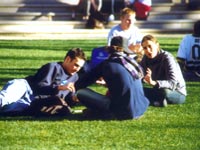|
|||||||||||||||||||||||||||||||||||||||||||||||||||
| Language & Politics - ARTS2844 | |||||||||||||||||||||||||||||||||||||||||||||||||||

Description
Subject Area: Politics This course can also be studied in the following specialisations: Australian Studies; International Relations This shelf course has two modules. The first module focuses on propaganda & satire through a study of rhetoric. Therefore, it covers:
The second module focuses on language & the study of social science & covers such topics as:
Module: "Propaganda & Satire"
Propaganda and public relations are essential to representative democracy and the modern state, even to military strategies such as the war on terror. Along with satire, they are forms of persuasive argument. Yet they are seen as threats to democracy because of their potential for lies, spin and manipulation. This subject disentangles such issues while exploring rhetoric, public diplomacy, the nature of rationality and truth in argument, the war on terror, the internet and new media. Satire also has a difficult place in theories of democracy, as revealed in the Danish cartoon controversy, and there is a history of satire overlapping with propaganda. Through this subject, students will appreciate the political discipline and learn that the social sciences depend on interpretation and language. Module: "Language, Politics and Society" (Semester 1, 2011) This course considers the relationship between language and politics in two ways. It is concerned , firstly with the the conduct of politics as a particular use of language, examining such issues as the meaning of 'justice', 'power', 'sovereignty', 'national interest', 'national security' and so on. Politics, as an activity is carried out in large part through speech and writing, and people often see politics as involving the 'abuse' of language by politicians and other people, so this issue is important. In addition, however, the course will examine the way in which language is used in the academic study of politics, and whether standard ideas about studying society and politics 'objectively' and 'scientifically' are linguistically and philosophically 'naive' in some way. The ideas of the Austrian philosopher Ludwig Wittgenstein will be used extensively in both parts of the course. |
|||||||||||||||||||||||||||||||||||||||||||||||||||


